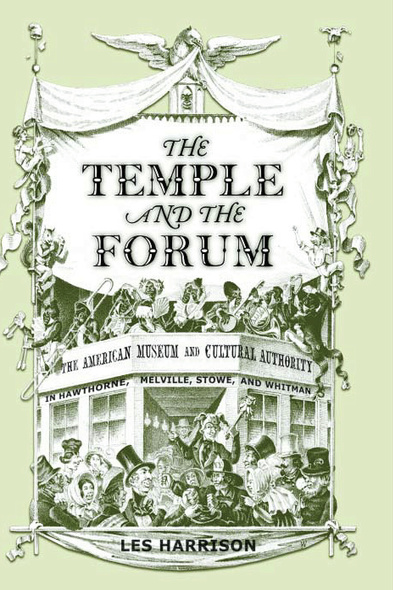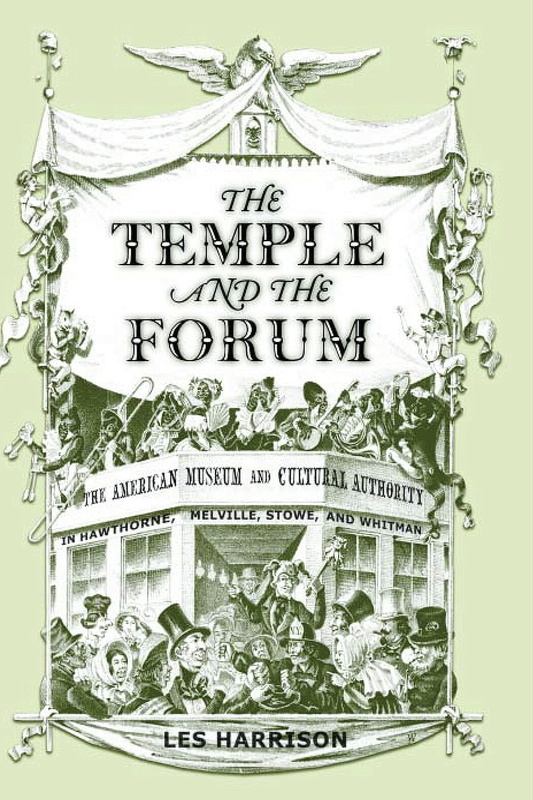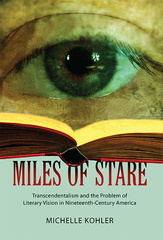The Temple and the Forum
American Museum and Cultural Authority in Hawthorne, Melville, Stowe, and Whitman
The relationship between developing museum and literary cultures expressed in the works of four canonical American authors
The rise of the museum as a cultural institution in 19th-century America brought with it many contested notions—of what artifacts merited preservation or display and the role of museums in public life and the cultural marketplace. In The Temple and the Forum, Les Harrison excavates the shared concerns and practices of 19th-century American museums and the literary productions of Nathaniel Hawthorne, Herman Melville, Harriet Beecher Stowe, and Walt Whitman.
The various representational strategies of museums suggested to these authors solutions to problems of literary and political representation. In probing the practices of three of the 19th-century’s most significant museums—Charles Wilson Peale’s Philadelphia Museum (1785?), P. T. Barnum’s American Museum (1841?), and the United States National Museum at the Smithsonian (1879—present)—Harrison identifies two dominant models in the struggle over what museums should be: the temple, an institution for the projection and protection of official culture, and the forum, its populist, marketplace counterpart.
Merging historical research with textual analysis, Harrison examines manifestations of the temple and the forum in the works of these authors
and reconnects their works to the larger literary and cultural marketplace in which they circulated. What emerges is a veiled chapter in the history of American culture: the widening of literary and cultural distinctions between legitimate and illegitimate cultural forms, republicanism and democracy, and the literary and the popular—the temple and the forum.
An ambitious, highly original, well-written, and beautifully researched piece of scholarship. . . . Harrison’s project is the first to analyze fully P. T. Barnum’s American Museum—arguably the best-known cultural institution in antebellum America—in relation to the literary culture of the period. His concern with the politics of interpretation and authority in public spaces links a surprising range of writers to the commercial extravaganzas pioneered by Barnum, and it leads Harrison to a remarkable excavation of antebellum America’s now-forgotten public spaces. In its careful attention to the politics of cultural authority, The Temple and the Forum proves a worthy successor to Lawrence Levine’s classic Highbrow/Lowbrow.’
—Benjamin Reiss, author of The Showman and the Slave: Race, Death, and Memory in Barnum's America
Normal0falsefalsefalseMicrosoftInternetExplorer4‘Les Harrison’s densely argued and amply illustrated treatment of nineteenth-century U.S. literature and museum culture begins with Duncan Cameron’s formulation of the museum’s two roles in a democracy: it may serve as a temple, codifying for visitors the values of the powerful, or it may function as a forum, offering the public a ‘place for confrontation, experimentation, and debate.’ . . . With its attention to institutional sites as expressions and arbiters of contested cultural models, The Temple and the Forum joins an American Studies tradition represented by such scholars as Karen Haltunnen, John Kasson, and Lawrence Levine (all of whom Harrison cites). Anyone interested in U.S. literature, performance studies, or theorizations of the public sphere will find much of interest.’
—American Studies Journal
Les Harrison is Assistant Professor of English at the Virginia Commonwealth University.






